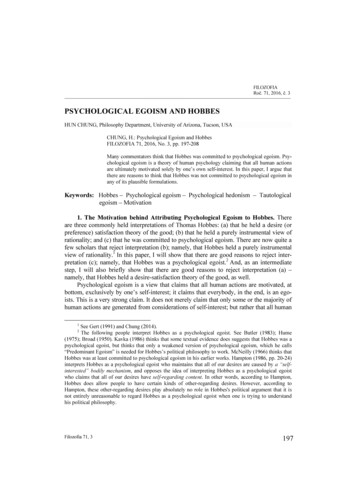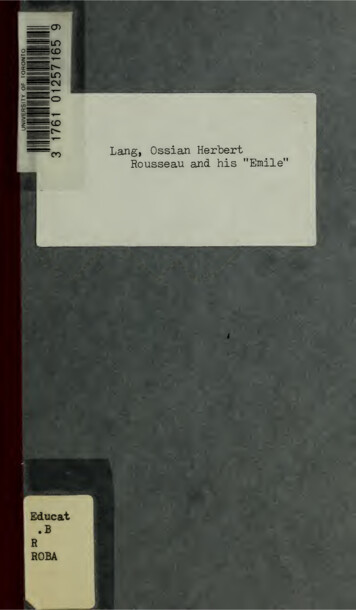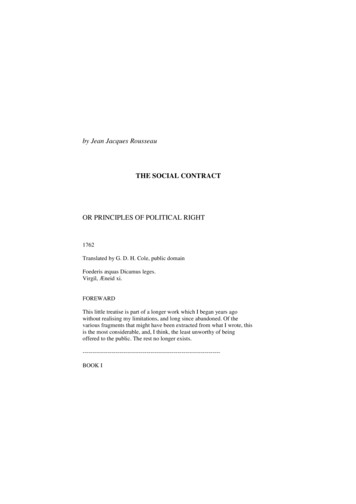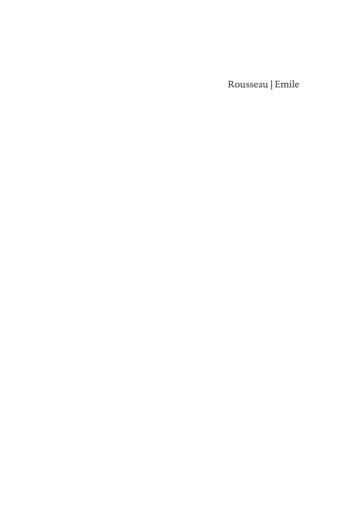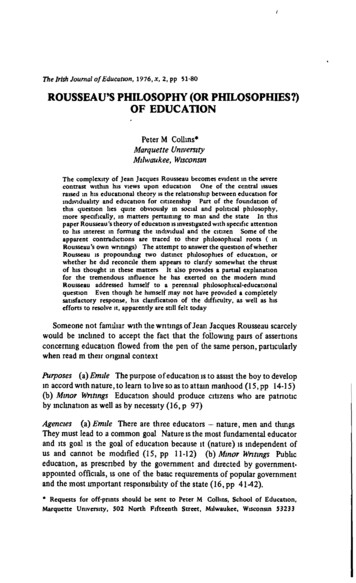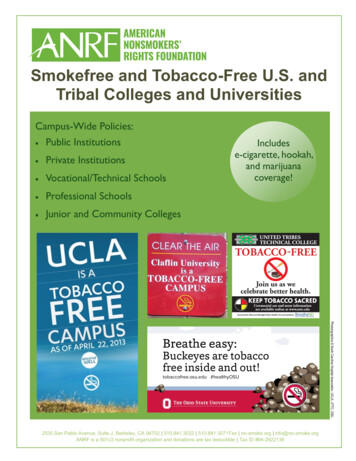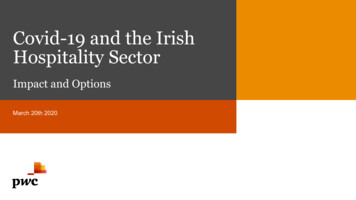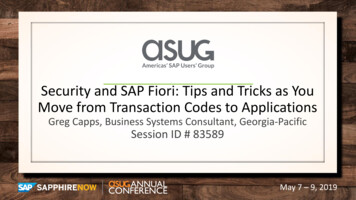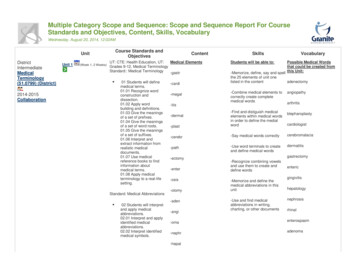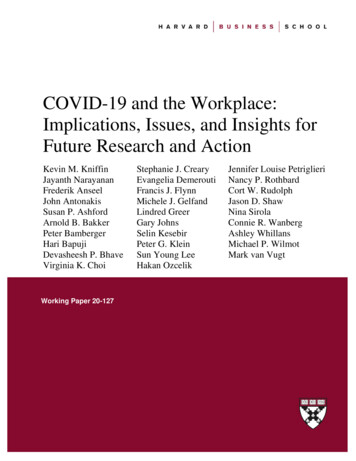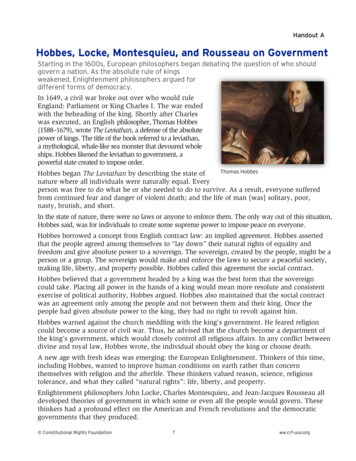
Transcription
Handout AHobbes, Locke, Montesquieu, and Rousseau on GovernmentStarting in the 1600s, European philosophers began debating the question of who shouldgovern a nation. As the absolute rule of kingsweakened, Enlightenment philosophers argued fordifferent forms of democracy.In 1649, a civil war broke out over who would ruleEngland: Parliament or King Charles I. The war endedwith the beheading of the king. Shortly after Charleswas executed, an English philosopher, Thomas Hobbes(1588–1679), wrote The Leviathan, a defense of the absolutepower of kings. The title of the book referred to a leviathan,a mythological, whale-like sea monster that devoured wholeships. Hobbes likened the leviathan to government, apowerful state created to impose order.Thomas HobbesHobbes began The Leviathan by describing the state ofnature where all individuals were naturally equal. Everyperson was free to do what he or she needed to do to survive. As a result, everyone sufferedfrom continued fear and danger of violent death; and the life of man [was] solitary, poor,nasty, brutish, and short.In the state of nature, there were no laws or anyone to enforce them. The only way out of this situation,Hobbes said, was for individuals to create some supreme power to impose peace on everyone.Hobbes borrowed a concept from English contract law: an implied agreement. Hobbes assertedthat the people agreed among themselves to “lay down” their natural rights of equality andfreedom and give absolute power to a sovereign. The sovereign, created by the people, might be aperson or a group. The sovereign would make and enforce the laws to secure a peaceful society,making life, liberty, and property possible. Hobbes called this agreement the social contract.Hobbes believed that a government headed by a king was the best form that the sovereigncould take. Placing all power in the hands of a king would mean more resolute and consistentexercise of political authority, Hobbes argued. Hobbes also maintained that the social contractwas an agreement only among the people and not between them and their king. Once thepeople had given absolute power to the king, they had no right to revolt against him.Hobbes warned against the church meddling with the king’s government. He feared religioncould become a source of civil war. Thus, he advised that the church become a department ofthe king’s government, which would closely control all religious affairs. In any conflict betweendivine and royal law, Hobbes wrote, the individual should obey the king or choose death.A new age with fresh ideas was emerging: the European Enlightenment. Thinkers of this time,including Hobbes, wanted to improve human conditions on earth rather than concernthemselves with religion and the afterlife. These thinkers valued reason, science, religioustolerance, and what they called “natural rights”: life, liberty, and property.Enlightenment philosophers John Locke, Charles Montesquieu, and Jean-Jacques Rousseau alldeveloped theories of government in which some or even all the people would govern. Thesethinkers had a profound effect on the American and French revolutions and the democraticgovernments that they produced. Constitutional Rights Foundation7ww.crf-usa.org
Locke: The Reluctant DemocratJohn Locke (1632–1704) was born shortly before theEnglish Civil War. Locke studied science and medicine atOxford University and became a professor there. Hesided with the Protestant Parliament against the RomanCatholic King James II in the Glorious Revolution of1685. This event reduced the power of the king andmade Parliament the major authority in Englishgovernment.In 1690, Locke published his Two Treatises ofGovernment. He generally agreed with Hobbes about thebrutality of the state of nature, which required a socialcontract to assure peace. But he disagreed with Hobbeson two major points.First, Locke argued that natural rights such as life,liberty, and property existed in the state of nature andcould never be taken away or even voluntarily given upby individuals. These rights were “inalienable”(impossible to surrender). Locke also disagreed withJohn LockeHobbes about the social contract. For him, it was not justan agreement among the people, but between them and the sovereign (preferably a king).According to Locke, the natural rights of individuals limited the power of the king. The kingdid not hold absolute power, as Hobbes had said, but acted only to enforce and protect thenatural rights of the people. If a sovereign violated these rights, the social contract wasbroken, and the people had the right to revolt and establish a new government. Less than 100years after Locke wrote his Two Treatises of Government, Thomas Jefferson used his theory inwriting the Declaration of Independence.Although Locke spoke out for freedom of thought, speech, and religion, he believed propertyto be the most important natural right. He declared that owners may do whatever they wantwith their property as long as they do not invade the rights of others. Government, he said,was mainly necessary to promote the “public good,” that is to protect property and encouragecommerce and little else. “Govern lightly,” Locke said.Locke favored a representative government such as the English Parliament, which had ahereditary House of Lords and an elected House of Commons. But he wanted representativesto be only men of property and business. Consequently, only adult male property ownersshould have the right to vote. Locke was reluctant to allow the propertyless masses of peopleto participate in government because he believed that they were unfit.The supreme authority of government, Locke said, should reside in the law-makinglegislature, like England’s Parliament. The executive (prime minister) and courts would becreations of the legislature and under its authority. Constitutional Rights Foundation8ww.crf-usa.org
Montesquieu: The Balanced DemocratWhen Charles Montesquieu (1689–1755) wasborn, France was ruled by an absolute king, LouisXIV. Montesquieu was born into a noble familyand educated in the law. He traveled extensivelythroughout Europe, including England, where hestudied the Parliament. In 1722, he wrote a book,ridiculing the reign of Louis XIV and the doctrinesof the Roman Catholic Church.Charles MontesquieuMontesquieu published his greatest work, TheSpirit of the Laws, in 1748. Unlike Hobbes andLocke, Montesquieu believed that in the state ofnature individuals were so fearful that theyavoided violence and war. The need for food,Montesquieu said, caused the timid humans toassociate with others and seek to live in a society.“As soon as man enters into a state of society,”Montesquieu wrote, “he loses the sense of hisweakness, equality ceases, and then commencesthe state of war.”Montesquieu did not describe a social contract assuch. But he said that the state of war among individuals and nations led to human laws andgovernment.Montesquieu wrote that the main purpose of government is to maintain law and order,political liberty, and the property of the individual. Montesquieu opposed the absolutemonarchy of his home country and favored the English system as the best model ofgovernment.Montesquieu somewhat misinterpreted how political power was actually exercised inEngland. When he wrote The Spirit of the Laws, power was concentrated pretty much inParliament, the national legislature. Basing his ideas on separation of powers in the ancientRoman Republic, Montesquieu thought he saw a separation and balancing of the powers ofgovernment in England as well.Montesquieu viewed the English king as exercising executive power balanced by thelaw-making Parliament, which was itself divided into the House of Lords and the House ofCommons, each checking the other. Then, the executive and legislative branches were stillfurther balanced by an independent court system.Montesquieu concluded that the best form of government was one in which the legislative,executive, and judicial powers were separate and kept each other in check to prevent anybranch from becoming too powerful. He believed that uniting these powers, as in themonarchy of Louis XIV, would lead to despotism. While Montesquieu’s separation of powerstheory did not accurately describe the government of England, Americans later adopted it asthe foundation of the U.S. Constitution. Constitutional Rights Foundation9ww.crf-usa.org
Rousseau: The Extreme DemocratJean-Jacques Rousseau (1712–1778) was born inGeneva, Switzerland, where all adult male citizenscould vote for a representative government. Rousseautraveled in France and Italy, educating himself.In 1751, he won an essay contest. His fresh view thatman was naturally good and was corrupted by societymade him a celebrity in the French salons whereartists, scientists, and writers gathered to discuss thelatest ideas.A few years later he published another essay in whichhe described savages in a state of nature as free, equal,peaceful, and happy. When people began to claimownership of property, Rousseau argued, inequality,murder, and war resulted.According to Rousseau, the powerful rich stole theland belonging to everyone and fooled the commonpeople into accepting them as rulers. RousseauJean-Jacques Rousseauconcluded that the social contract was not a willingagreement, as Hobbes, Locke, and Montesquieu had believed, but a fraud against the peoplecommitted by the rich.In 1762, Rousseau published his most important work on political theory, The Social Contract.His opening line is still striking today: “Man is born free, and everywhere he is in chains.”Rousseau agreed with Locke that the individual should never be forced to give up his or hernatural rights to a king.The problem in the state of nature, Rousseau said, was to find a way to protect everyone’slife, liberty, and property while each person remained free. Rousseau’s solution was forpeople to enter into a social contract. They would give up all their rights, not to a king, but to“the whole community,” all the people. He called all the people the “sovereign,” a term usedby Hobbes to mainly refer to a king. The people then exercised their “general will” to makelaws for the “public good.”Rousseau argued that the general will of the people could not be decided by electedrepresentatives. He believed in a direct democracy in which everyone voted to express thegeneral will and to make the laws of the land. Rousseau had in mind a democracy on a smallscale, a city-state like his native Geneva.In Rousseau’s democracy, anyone who disobeyed the general will of the people “will beforced to be free.” He believed that citizens must obey the laws or be forced to do so as longas they remained a resident of the state. This is a “civil state,” Rousseau says, where security,justice, liberty, and property are protected and enjoyed by all.All political power, according to Rousseau, must reside with the people, exercising theirgeneral will. There can be no separation of powers, as Montesquieu proposed. The people,meeting together, will deliberate individually on laws and then by majority vote find thegeneral will. Rousseau’s general will was later embodied in the words “We the people . . .” atthe beginning of the U.S. Constitution. Constitutional Rights Foundation10ww.crf-usa.org
Rousseau was rather vague on the mechanics of how his democracy would work. Therewould be a government of sorts, entrusted with administering the general will. But it wouldbe composed of “mere officials” who got their orders from the people.Rousseau believed that religion divided and weakened the state. “It is impossible to live inpeace with people you think are damned,” he said. He favored a “civil religion” that acceptedGod, but concentrated on the sacredness of the social contract.Rousseau realized that democracy as he envisioned it would be hard to maintain. He warned,“As soon as any man says of the affairs of the State, ‘What does it matter to me?’ the Statemay be given up for lost.”SourcesAaron, Richard I. “Locke.” New Encyclopaedia Britannica Macropaedia. 2002 ed. Abbott, Leonard Dalton, ed.Masterworks of Government. Garden City, N. Y.: Doubleday & Co., 1947. Conroy, Peter V. Jean-JacquesRousseau. Twayne Publishers, 1998. Cranston, Maurice. “Jean-Jacques Rousseau,” New EncyclopaediaBritannica Macropaedia. 2002 ed. Ebenstein, William. Great Political Thinkers, Plato to the Present, 3rd ed. NewYork: Holt, Rinhart and Winston, 1963. Havens, George R. Jean-Jacques Rousseau. Boston: Twayne Publishers,1978. “Hobbes, Thomas.” The New Encyclopaedia Britannica Micropaedia. 2002 ed. Levine, Andrew.Engaging Political Philosophy From Hobbes to Rawls. Oxford: Blackwell Publishers, 2002. Robertson, John.“The Enlightenment.” History Review. 1 Sept. 1997. Shackelton, Robert. “Montesquieu, Charles.” NewEnccyclopaedia Britannica Micropaedia. 2002 ed. Shklar, Judith N. Political Thought and Political Thinkers.Chicago: University of Chicago Press, 1998.Images: Wikimedia CommonsCite as: Martz, Carlton. "Hobbes, Locke, Montesquieu, and Rousseau on Government." Bill of Rights in Action.Constitutional Rights Foundation, Spring 2004. Constitutional Rights Foundation11ww.crf-usa.org
Commons, each checking the other. Then, the executive and legislative branches were still further balanced by an independent court system. Montesquieu concluded that the best form of government was one in which the legislative, executive, and judicial powers were separate and kept each other in check to prevent any branch from becoming too .
